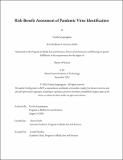| dc.contributor.advisor | Esvelt, Kevin | |
| dc.contributor.author | Jeyapragasan, Geetha | |
| dc.date.accessioned | 2024-12-02T21:13:57Z | |
| dc.date.available | 2024-12-02T21:13:57Z | |
| dc.date.issued | 2024-09 | |
| dc.date.submitted | 2024-11-19T19:17:53.687Z | |
| dc.identifier.uri | https://hdl.handle.net/1721.1/157708 | |
| dc.description.abstract | Pandemic Virus Identification (PVI) aims to assess unknown viruses for their pandemic potential in immunologically naive human populations. While proponents argue that PVI could facilitate targeted spillover prevention and accelerate medical countermeasure development, critics raise concerns about biosafety and biosecurity risks. This thesis presents a comprehensive mathematical framework to evaluate the benefits, biosafety risks, and biosecurity risks associated with PVI research.
Using a combination of mathematical modeling and expert elicitation, we developed a structured approach to estimate the potential impacts of PVI. Our framework suggests that identifying a single pandemic-capable virus through PVI could potentially save lives by reducing natural pandemic risks. However, this benefit is substantially outweighed by the estimated anthropogenic risks from potential accidental pandemic events and deliberate misuse scenarios. The overall expected value of identifying a single pandemic-capable pathogen was estimated to be strongly negative.
Significant uncertainty exists in many key parameters estimated through surveys, with wide confidence intervals reflecting the lack of consensus among experts. Expert opinions varied considerably on topics such as the likelihood of funding for medical countermeasures and the potential for deliberate misuse of pandemic agents. This modeling work primarily aims to provide exploratory estimates to guide future work.
Our findings underscore the urgent need for improved governance of research involving potential pandemic pathogens. This study provides a quantitative basis for ongoing discussions about the balance between scientific advancement and public safety in high-risk areas of life sciences research. | |
| dc.publisher | Massachusetts Institute of Technology | |
| dc.rights | In Copyright - Educational Use Permitted | |
| dc.rights | Copyright retained by author(s) | |
| dc.rights.uri | https://rightsstatements.org/page/InC-EDU/1.0/ | |
| dc.title | Risk-Benefit Assessment of Pandemic Virus Identification | |
| dc.type | Thesis | |
| dc.description.degree | S.M. | |
| dc.contributor.department | Program in Media Arts and Sciences (Massachusetts Institute of Technology) | |
| mit.thesis.degree | Master | |
| thesis.degree.name | Master of Science in Media Arts and Sciences | |
